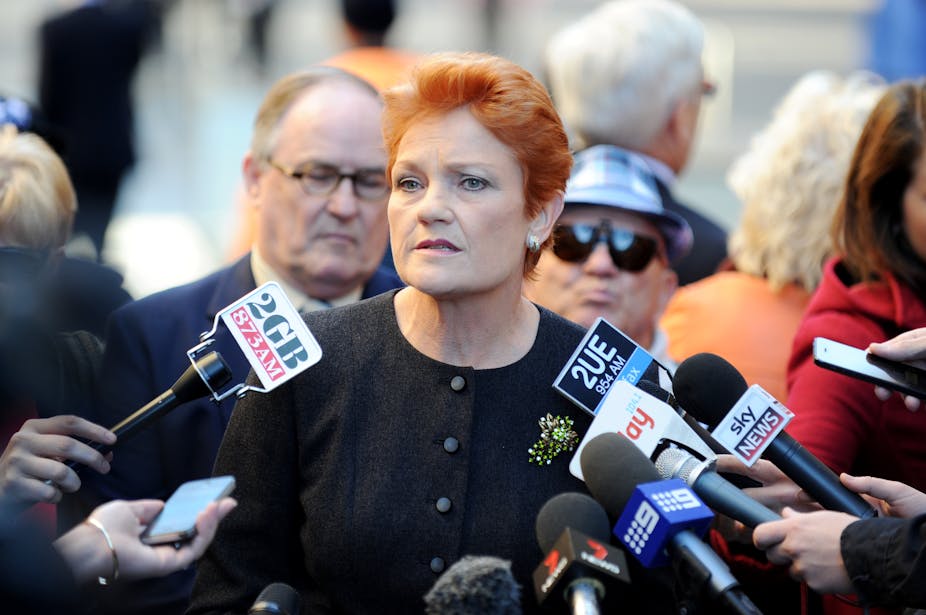Pauline Hanson’s return to public life and the emergence of right-wing parties such as Katter’s Australian Party and the Rise Up Australia Party has rekindled interest in far-right politics in Australia.
So, who are some of the key players on the right-wing fringe of Australian politics? And what are their electoral chances on September 7?
Australia First (AFN)
Australia First was originally formed in 1996 by the former Labor member for Kalgoorlie, Graeme Campbell, following his expulsion from the party.
Following a prolonged period of factional infighting, Australia First is now led by Jim Saleam, whose far-right credentials go back to the late 1970s and early 1980s and groups such as the National Socialist Party of Australia and National Action. Saleam was convicted and sentenced to three years jail for organising a shotgun attack on the home of African National Congress representative Eddie Funde in the mid-1980s.
The party is mainly Sydney-based and is standing candidates in ten seats, on a platform of anti-immigration, anti-multiculturalism, economic nationalism, one world government conspiracy and white nationalism. It is likely to poll less than 1% in the seats it contest.
Citizens Electoral Council (CEC)
A perennial campaigner, the Citizens Electoral Council was originally established in Queensland in 1988 as an offshoot of the Australian League of Rights. It has links to US-based activist and former presidential candidate Lyndon LaRouche, who in 1988 was sentenced to 15 years jail for mail fraud and tax evasion.
The CEC shares the Australian League of Rights’ conspiratorial view of the world where Jewish financiers - along with groups as diverse as the United Nations, the Mount Pelerin Society and the royal family - are involved in a one world government plot to control the world. It maintains a strong economic nationalist outlook, with a big emphasis on government’s role in providing infrastructure and support for industry.
The CEC is standing candidates in 24 seats, primarily in NSW, Queensland and Western Australia, and is likely to poll less than 1% in the seats it contests.
Family First (FFP)

Formed in 2002 by Pentecostal Pastor Dr Andrew Evans, the Family First Party’s highpoint at the federal level came in the 2004 election where Victorian Senate candidate Steve Fielding won a seat on the back of favourable preference flows, with just 1.88% of the primary vote.
Fielding was subsequently defeated in 2010. Queensland Senate candidate Wendy Francis courted controversy that year by linking legitimising gay marriage with child abuse. Family First runs on a pro-traditional family unit, socially conservative, anti-gay rights and climate change sceptic platform.
Family First is running candidates in 93 seats in all states except NSW, the ACT and the NT. It is likely to poll between 1-2% but is unlikely to replicate its success of 2004.
Katter’s Australian Party (KAP)

Katter’s Australian Party was founded by long-time state and federal politician Bob Katter, the National and more recently independent federal member for Kennedy since 1993. It currently holds three seats in the Queensland state parliament, having polled over 11% of the vote in the 2012 state election.
KAP is very much a rural, right-wing populist party with a strong emphasis on protectionism and government support for Australian industry as well as a very conservative social agenda. It is running candidates in 63 electorates, mostly in rural areas.
Recent polls have indicated the party’s support is around 4-5% in parts of rural Queensland which may give lead candidate and country and western singer James Blundell an outside chance of winning a Senate seat. Katter himself will comfortably win his seat of Kennedy again.
One Nation (ONP)
The most successful far-right party, One Nation was formed in 1997 on the back of Pauline Hanson’s initial success in the Queensland seat of Oxley. The party went on to win 11 seats in the 1998 Queensland state election and a Senate seat at the 1998 federal poll.
Hanson’s defeat in 1998 set off a prolonged series of factional infighting and political disasters, culminating in her and party national director David Ettridge’s being jailed for electoral fraud in 2003. The convictions were eventually overturned on appeal. One Nation will run on a right-wing populist, anti-immigration, anti-multicultural, anti-Aboriginal rights, pro-protectionist and economic nationalist platform.
In 2013, the party is running 15 lower house candidates, primarily across rural and regional NSW and Queensland. Hanson has been welcomed back into the fold as the lead NSW Senate candidate, but with both major parties preferencing against her, she will find it difficult to reach a quota even with the support of most other fellow far-right travellers.
Rise Up Australia (RUA)

The Rise Up Australia Party was launched in 2011 by Pastor Danny Nalliah, founder of the controversial Catch the Fire Ministries. Nalliah came to prominence in 2004 for successfully challenging Victoria’s racial vilification laws after being found guilty along with colleague Daniel Scot of racially vilifying Muslims. He has since courted controversy for suggesting that Victoria’s Black Saturday bushfires were a consequence of the state government’s abortion law reforms.
Running on an anti-Muslim, anti-multiculturalism and socially conservative platform, a key policy of the Rise Up Australia Party is the restriction of Muslim immigration.
The party is standing candidates in 77 lower house seats. While its electoral prospects are slim, Nalliah remains an outside chance of emulating Steve Fielding and John Madigan’s Senate success in Victoria given positive preference flows.

